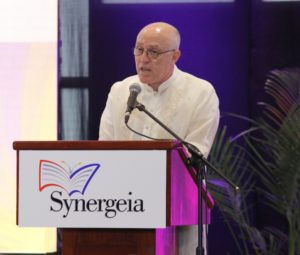
In his message during the 12th National Education Summit, US Charge d’Affairs Michael Klecheski acknowledged the shared work to strengthen education governance in the Philippines. “The United States Agency for International Development, commonly known as USAID, has been working in the Philippines for over 50 years now. The US Government believes that education is crucial for development – both as individuals and for the country as a whole. Research demonstrates that education raises individual incomes and, in an enabling environment, can contribute to broad-based and inclusive economic growth.”
Charge d’Affairs Klecheski proceeded to mention that since 2013, USAID has been proud to partner with Synergeia Foundation to implement Education Governance Effectiveness or EdGE. “Guided by the proverb that “it takes a village to raise a child,” EdGE strengthens community participation in education. EdGE mentors representatives from local governments; school division superintendents and supervisors; members of local school boards; and school heads to effectively plan, manage, and evaluate education programs.”
“Through this partnership, in collaboration with the Philippine Government, we have trained more than 10,400 administrators and officials in 91 cities and municipalities. As a result, there are now nearly 1,400 active local school boards and school governing councils. These school boards and councils have led to nearly 3,000 schools conducting remedial reading programs with 300,000 participants. And we are proud that today, almost 78 percent of these learners can now fluently read by the time they finish grade two.”
“xxxToday, five years later, we celebrate your successes.”
Mr. Klecheski stated that early-grade literacy is the foundation for future learning and this foundation also requires strong community engagement, accountability and transparency in education. “Good education governance contributes to better literacy by ensuring that local governments use public education funds effectively and transparently, and that these funds are aligned with identified education needs. With more efficient spending, barangays and school boards are able to purchase teaching and learning materials and organize after-school remedial reading programs. Good education governance involves the collective participation of all stakeholders and partnerships with national, regional and local governments, civil society and the private sector.”
Mr. Klecheski also congratulated the winners of the Seal of Good Education Governance and the winners of the Jesse Robredo Excellence Award. “We hope that this seal becomes both a challenge and an inspiration for local governments to continue championing good education governance. I am honored to witness your commitment and I celebrate our partnership to improve basic education in the Philippines, for a more stable and prosperous Philippines.”




